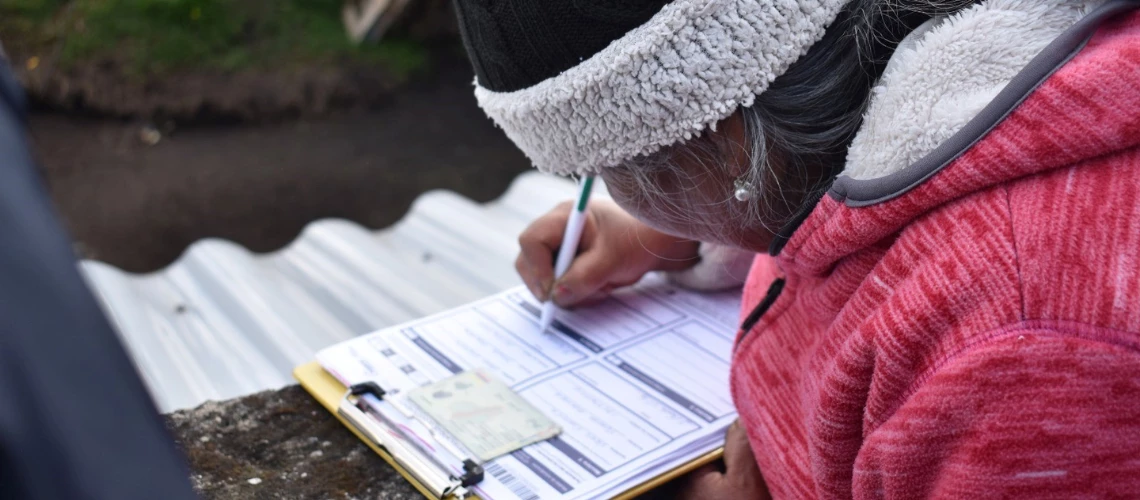 Mujer ecuatoriana llenado un formulario del sitema de registros sociales.
Mujer ecuatoriana llenado un formulario del sitema de registros sociales.
Identifying those who are most in need of social protection services and benefits is a challenge for any decision maker. The erroneous identification of the population group that needs assistance may result in serious consequences in terms of equality, effectiveness of public expenditure, and primarily, the legitimacy of any country’s social policy.
In Latin America and the Caribbean, social registries have become a key element in the design and implementation of social policy. They allow for the transparent identification of the persons living in poverty and vulnerable situations and serve as a tool for monitoring changes in the level of wellbeing of each person or family identified.
More than information systems, social registries are a key instrument for policy management and the social and economic inclusion of the most vulnerable groups . Good social registries help with the identification of those who need to be reached and the exploration of where possible care gaps exist.
The history of social registries in Latin America and the Caribbean dates to four decades ago when countries in the region, such as Chile, began to consolidate socioeconomic information on the poorest households in social welfare records. A second generation of social registries, such as those of Mexico and Brazil, emerged from the records of cash transfer program beneficiaries. In the recent aftermath of the COVID-19 pandemic, countries like Ecuador and Costa Rica have used the exchange of information collected from households with large administrative data sets to strengthen and update their registries.
The pandemic unintentionally gave a dynamic push to social registries in the region. Because of the inability to interact with households, the registries had to look for other available information and found that interoperability with other databases contributed to more up-to-date household information. In addition, social registries are being used as tools to prevent climate change and disaster-related crises.
Development and integration of social registries
The development and expansion of social registries has allowed them to become more inclusive, that is, to have greater coverage, especially of vulnerable groups. They have also become more efficient with more updated and accurate information, and become more flexible, for example, they can be used in times of emergency to identify groups affected by an adverse event.
In turn, the integration of information into social registries not only helps to reduce the operational complexity for both program administrators and the households that want to access them, but also reduces costs for the State, by preventing multiple parallel processes of collecting information from households. In addition, they improve the experience of the citizen who provides information to a single entity to apply or be eligible for multiple interventions.
Between 2019 and 2023, the World Bank has worked hand in hand with Ecuador’s government to include 550,000 new people in social protection programs, through better identification in the registry, moving from 4 to 9 out of 10 poor households . In terms of efficiency, these actions helped to reduce the poverty gap by 6.4 percentage points in the same period.
Despite what has been achieved, in Ecuador and at the regional level, there is still a long way to go to consolidate the strengthening of social registries. There are four pending issues :
- Make progress in the consolidation of their institutional structure and legal framework.
- Improve the use of the registries in the program implementation chain so that they can be used not only to target benefits, but also as a tool for promoting consistent and relevant supply to households.
- Promote interoperability and ensure information exchange protocols.
- Ensure their adoption and use by the entities responsible for social policy and the citizen’s understanding of their function.
For the World Bank, social registries are the backbone of social protection systems. Not only do they play a critical role in the program implementation chain, but they also help to organize and interlink the delivery of national and local services. Bearing this in mind, we have worked for more than three decades to help countries create and consolidate their registries through credit and technical assistance operations in Brazil, Colombia, Costa Rica, the Dominican Republic, Ecuador, Guatemala, Haiti, Honduras, Jamaica, and Peru. As part of this thrust, the countries of the region have decided to form a learning community to address outstanding challenges and the World Bank, along with other multilateral partners, supported this initiative at the event organized by the Social Registry Unit of Ecuador [Unidad del Registro Social de Ecuador] last September in Quito.
Stay updated with our weekly article
Related articles:



Join the Conversation